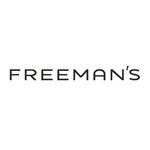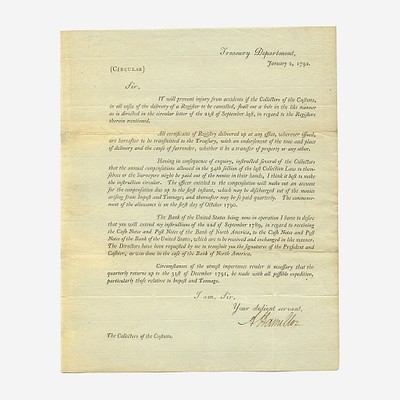[Hamilton, Alexander] [Treasury Department] Printed Treasury Department Circular, signed
About Seller
2400 Market St
Philadelphia, PA 19147
United States
Established in 1805, Freeman’s Auction House holds tradition close, with a progressive mind-set towards marketing and promotion, along with access to a team of top experts in the auction business. And now with offices in New England, the Southeast, and on the West Coast, it has never been easier to ...Read more
Two ways to bid:
- Leave a max absentee bid and the platform will bid on your behalf up to your maximum bid during the live auction.
- Bid live during the auction and your bids will be submitted real-time to the auctioneer.
Bid Increments
| Price | Bid Increment |
|---|---|
| $0 | $25 |
| $500 | $50 |
| $1,000 | $100 |
| $2,000 | $200 |
| $3,000 | $250 |
| $5,000 | $500 |
| $10,000 | $1,000 |
| $20,000 | $2,000 |
| $30,000 | $2,500 |
| $50,000 | $5,000 |
| $100,000 | $10,000 |
About Auction
Oct 25, 2021
Freeman's is honored to present The Alexander Hamilton Collection of John E. Herzog, a single-owner sale of Alexander Hamilton material, on October 25. Curated by Darren Winston, Head of the Books and Manuscripts Department. Freeman's info@freemansauction.com
- Lot Description
[Hamilton, Alexander] [Treasury Department] Printed Treasury Department Circular, signed
Alexander Hamilton gives instructions to the Collectors of the Customs regarding the newly operating First Bank of the United States
(Philadelphia): Treasury Department, January 2, 1792. One sheet, 9 1/2 x 7 5/8 in. (241 x 194 mm). Printed Treasury Department Circular, issued and signed by Alexander Hamilton as first Secretary of the Treasury, to the Collectors of the Customs. Creasing from original folds. A fine example. Ford, Bibliotheca Hamiltoniana 208; not in Evans. Lot includes an engraved portrait of Hamilton.
A rare Treasury Department circular issued less than a month after the opening of the First Bank of the United States. The circular covers a variety of topics, including instructions on the cancellation and surrender of Ship's Registry papers, compensation for Collectors and Surveyors (Hamilton incorrectly cites the 54th Collection Law when he meant the 53rd), and importantly mentions the newly operating Bank of the United States, "The Bank of the United States being now in operation I have to desire that you will extend my instructions of the 22d of September 1789, in regard to receiving the Cash Notes and Post Notes of the Bank of North America, to the Cash Notes and Post Notes of the Bank of the United States, which are to be received and exchanged in like manner..." The First Bank of the United States began operations on December 12, 1791.
As Ron Chernow observes regarding Hamilton's attention to the finest detail concerning Customs, "Hamilton's power as head of customs extended beyond his legion of employees. Equally important was the comprehensive view of economic activity that he gained in a large country hobbled by primitive communications. Seven of every eight Treasury Department employees worked outside the capital, supplying Hamilton with an unending stream of valuable intelligence...To monitor government receipts, Hamilton insisted upon weekly reports from collectors, enabling him to track every ship passing through American posts. With his insatiable curiosity�he wanted to know the size, strength, and construction of ships, their schedules and trading routes and cargoes�he pioneered questionnaires to gather such data..." At this point during the infant stages of the new Federal government, customs duties made up a significant part of the government's tax revenue, so a properly functioning system of recordkeeping, as Hamilton dutifully puts into motion here, was key in keeping the government funded and financially stable.
A rare circular�no examples found in the auction record�attesting to one of Hamilton's greatest, and most controversial, feats as the first Secretary of the Treasury, the establishment of the First Bank of the United States.
- Shipping Info
-
No lot may be removed from Freeman’s premises until the buyer has paid in full the purchase price therefor including Buyer’s Premium or has satisfied such terms that Freeman’s, in its sole discretion, shall require. Subject to the foregoing, all Property shall be paid for and removed by the buyer at his/ her expense within ten (10) days of sale and, if not so removed, may be sold by Freeman’s, or sent by Freeman’s to a third-party storage facility, at the sole risk and charge of the buyer(s), and Freeman’s may prohibit the buyer from participating, directly or indirectly, as a bidder or buyer in any future sale or sales. In addition to other remedies available to Freeman’s by law, Freeman’s reserves the right to impose a late charge of 1.5% per month of the total purchase price on any balance remaining ten (10) days after the day of sale. If Property is not removed by the buyer within ten (10) days, a handling charge of 2% of the total purchase price per month from the tenth day after the sale until removal by the buyer shall be payable to Freeman’s by the buyer. Freeman’s will not be responsible for any loss, damage, theft, or otherwise responsible for any goods left in Freeman’s possession after ten (10) days. If the foregoing conditions or any applicable provisions of law are not complied with, in addition to other remedies available to Freeman’s and the Consignor (including without limitation the right to hold the buyer(s) liable for the bid price) Freeman’s, at its option, may either cancel the sale, retaining as liquidated damages all payments made by the buyer(s), or resell the property. In such event, the buyer(s) shall remain liable for any deficiency in the original purchase price and will also be responsible for all costs, including warehousing, the expense of the ultimate sale, and Freeman’s commission at its regular rates together with all related and incidental charges, including legal fees. Payment is a precondition to removal. Payment shall be by cash, certified check or similar bank draft, or any other method approved by Freeman’s. Checks will not be deemed to constitute payment until cleared. Any exceptions must be made upon Freeman’s written approval of credit prior to sale. In addition, a defaulting buyer will be deemed to have granted and assigned to Freeman’s, a continuing security interest of first priority in any property or money of, or owing to such buyer in Freeman’ possession, and Freeman’s may retain and apply such property or money as collateral security for the obligations due to Freeman’s. Freeman’s shall have all of the rights accorded a secured party under the Pennsylvania Uniform Commercial Code.
-
- Buyer's Premium



 EUR
EUR CAD
CAD AUD
AUD GBP
GBP MXN
MXN HKD
HKD CNY
CNY MYR
MYR SEK
SEK SGD
SGD CHF
CHF THB
THB![[Hamilton, Alexander] [Treasury Department] Printed Treasury Department Circular, signed](https://s1.img.bidsquare.com/item/l/9470/9470949.jpeg?t=1MwoER)
![[Hamilton, Alexander] [Treasury Department] Printed Treasury Department Circular, signed](https://s1.img.bidsquare.com/item/s/9470/9470949.jpeg?t=1MwoER)










